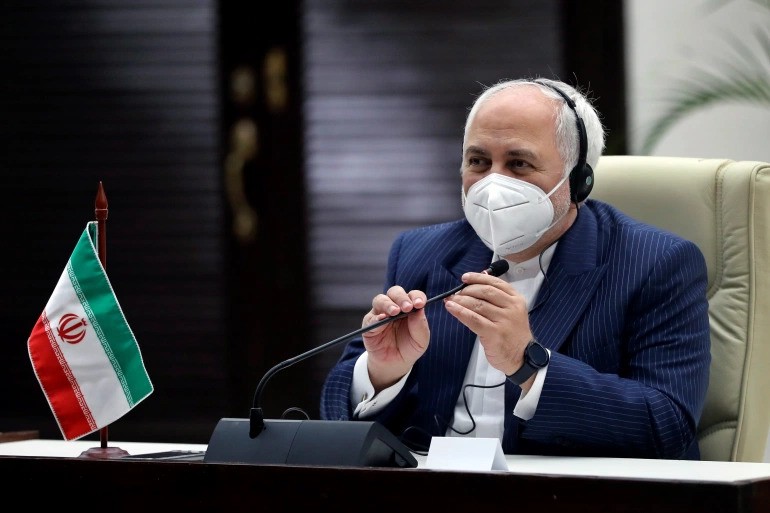Iran’s Foreign Minister Javad Zarif says unilateral sanctions imposed by the United States caused $1 trillion worth of damage to Iran’s economy. Iran seeks compensation if the US lifts the sanctions and returns to the nuclear deal. AlJazeera reported.
Iranian Foreign Minister said Tehran will want to negotiate on the damages it has suffered after the US takes action to restore Iran’s 2015 nuclear deal with world powers through lifting sanctions.
Mr. Javad Zarif told Iranian state-owned news network PressTV, “When we meet, we will raise compensation.”
Russia to integrate combat drones and manned fighter jets
He further added, “Whether those compensations will take the form of reparation, or whether they take the form of investment, or whether they take the form of measures to prevent a repeat of what Trump did.”
In 2018, the former US President Trump unilaterally pulled out of Iran’s nuclear deal and put harsh, comprehensive sanctions that target all the sectors of Iran’s economy.
The Iranian government wants the Biden administration to make a speedy return to the nuclear deal.
At the start of February, Iran’s Foreign Minister said. “Time is running out for the American’s both because of the parliament bill and election atmosphere that will follow the Iranian new year.”
In December 2020, the Iranian parliament passed the legislation that set a two months deadline for the US to ease the sanctions.
PLA Navy commissioned Type 056A corvettes for coastal defense
According to Javad Zarif, Trump reimposed 800 sanctions that were put on Iran before the nuclear deal and imposed 800 new ones.
The diplomat said China and Russia, the signatories of the nuclear deal have been Iran’s “friends” during the sanctions period. Evidence for which are dozens of sanctions imposed on their individuals and entities.
But on the other hand, the European signatories of the nuclear deal, Germany, France, and the United Kingdom known as the E3, have engaged in no tangible efforts to maintain their ties with Iran. Zarif said.
US: DARPA UAV LongShot air-to-air missile program
“The situation Europe has created for itself is that it has to wait for the US to make a decision. It lives at the behest and mercy of the US.” Mr. Zarif told the news channel.
“Now, they should convince the US to come back (to the nuclear deal) at least to allow them… to maintain their dignity and allow them to fulfill their obligations. That’s not a tall order.”
‘We got what we wanted’
Iran’s Foreign Minister said if the US fails to lift the sanctions, Tehran will continue to expand its nuclear program. And also Iran will have no need to leave the JCPOA.
After the US leaves the nuclear agreement and put sanctions on Iran, it has gradually increased the uranium enrichment limit from 4 percent (nuclear deal defined maximum limit) and will maximize it of up to 20 percent as ordered by the Iranian parliament.
The 21st century is going to be the Chinese century
“This is not a threat. We are simply exercising the remedial measures foreseen in the JCPOA.” Javad Zarif added Iran does not want to engage in “nuclear extortion” as former US Secretary of State Mike Pompeo has claimed.
Instead, the US is engaging in extortion of preventing Iran from buying food, medicine, and vaccines through sanctions during the pandemic.
The Minister also said the US is still blocking Iran’s request for a $5 billion loan from IMF and also preventing other countries such as South Korea from paying back billions of dollars worth of Iran’s money.
$6 trillion and 8 hundred thousand of lives, the cost of US global war on terror
He said the newly elected Joe Biden’s administration is still continuing the ‘maximum pressure’ policy of Trump despite promising to restore the JCPOA.
“We got what we wanted out of the JCPOA. End of (United Nations) Security Council resolutions. End of US lies about our nuclear program.” He said Iran is the only country in the world to have its right to enrich uranium recognized by a UN Security Council Resolution.
He also said Iran is now much less dependent on oil, so it can continue if the US fails to come back to the nuclear deal.
‘No more camera tapes’
According to the law passed by the Iranian Parliament in December last year, the government must end snap inspections of its nuclear sites by the International Atomic Energy Agency (IAEA) since US sanctions have not been lifted.
The General Director of IAEA Rafael Grossi offered to visit Tehran to discuss the move.
Grossi met with the head of the Atomic Energy Organization of Iran, Ali Akbar Salehi, and Foreign Minister Javad Zarif, but no deal on the talks was released.
North Korea further developed nuclear, missile programs in 2020: UN report
Zarif said the decision to cut-off cameras installed by the IAEA in Iran’s nuclear sites is a technical one that will not be made by him.
“We will be required by law not to provide the tapes of those cameras to the IAEA.” he added.
Analysis:
The Iranian government wants the revival of the nuclear accord but, the way which benefits them. On the other hand, the US government is exploring the pros and cons of their returning to the deal.
The Biden administration is contacting other signatories of the JCPOA especially the European ones. The decision made by Washington today will decide the fate of Iran’s nuclear program.
Iran’s nuclear deal could be limited to a 4 percent enrichment level if the US rejoins the deal or it could go worse if it fails to enter the JCPOA as a signatory.
Also, the US decision will bring peace and stabilization to the Middle East if they enter the deal. Otherwise, the region will be more destabilized and uncertain because the Saudi Arabian government is also desperate to start the nuclear program in response to Tehran if they increase the uranium enrichment.


